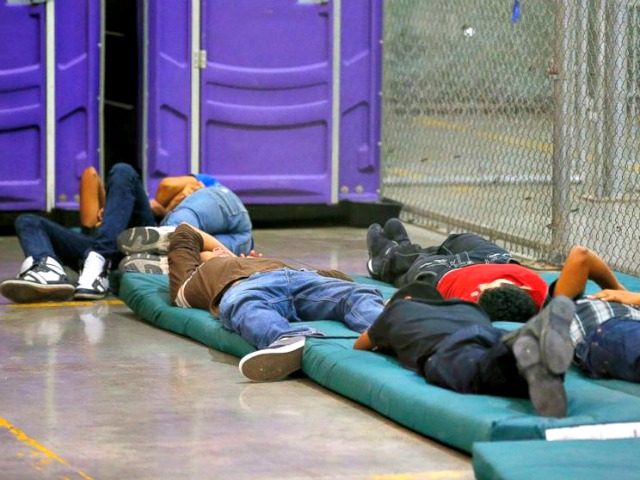The Department of Health and Human Services said Tuesday that it would allow the temporary release of smuggled youths and children into homes that may contain illegal migrants.
But the agency also said it would keep fingerprinting U.S.-based people who try to house or “sponsor” the many youths and children who are awaiting asylum verdicts after being smuggled by coyotes up to government-run shelters.
The announcement was a disappointment to the pro-migration advocates who oppose any screening of potential sponsors. The groups oppose President Donald Trump’s policy of identifying, arresting and deporting illegal migrants who offer to house the many young migrants who are kept in HHS agency shelters until their asylum cases are heard by backlogged immigration courts.
The fingerprinting policy was adopted by Trump’s deputies because the vast majority of sponsors are either parents or relatives of the smuggled children, teenagers, and youths. The youths are classified as UACs, for “Unaccompanied Alien Children.” In fact, many of the UACs are carefully smuggled into the United States cartel-affiliated coyotes, working under a contract with illegal migrant parents living in the United States.
During President Barack Obama’s two terms, officials did not try to fingerprint or properly identify the legal status of the sponsors. The failure to identify the parents ensured that federal agencies were completing the trafficking contracts by flying the youths to the HHS shelters, where they could be picked up by the illegal migrant parents.
Trump’s identification policy has allowed officials to arrest at least 170 illegal migrant sponsors. The arrests deter migrants from picking up their teenagers and help to narrow the U.S. exit of this coyote-to-agency-to-sponsor migrant pipeline.
The pro-migration groups were disappointed when the agency denied media reports early Tuesday that officials would stop fingerprinting the people who try to sponsor children:
An HHS spokesman said the agency would keep fingerprinting and investigating all sponsors — but would stop criminal checks and fingerprints of other people in the sponsor’s home.
That is a win for the pro-migration groups, in part, because it would allow an illegal migrant parent in a home to conceal themselves behind a spouse who has legal or temporary status. The ability to hide illegal migrant parents from discovery likely will reduce the risk for parents seeking to sponsor their children.
But that gain is far less than the groups’ goal of ending the federal identification of illegal migrant sponsors.
The HHS statement said:
Given the robust processes in place for evaluating sponsors, ORR has determined that at this time it is in the best interest of the UAC to issue an operational directive modifying the requirement of household members to be fingerprinted. Fingerprints will continue to be required of all sponsors. The fingerprints will continue to be cross-checked with the Federal Bureau of Investigation’s (FBI) national criminal history and state repository records and also includes a search of DHS arrest records. ORR will continue to do public records checks on all adult household members to ensure child safety.
Our focus is always on the safety and best interest of each child. These are vulnerable children in difficult circumstances, and HHS treats its responsibility for each child with the utmost care.
Pro-migration groups showed their disappointment and urged more political pressure:
Democratic legislators have drafted a bill that would bar officials from arresting illegals who offer to sponsor children.
The New York Times cheered the partial rollback, saying:
The Trump administration announced on Tuesday that it planned to ease onerous security requirements for sponsors of migrant children, meaning that thousands who have been parked in shelters for months could soon be released and reunited with family members.
…
As a result, it will take significantly less time to place children with their families, and their stays in the shelters will be much shorter.
Officials at HHS are not security officials. They are social workers and prefer to release more migrant children to the parents, even though the release will create more incentives to smuggle more children into the United States. The officials’ focus on the children was highlighted in an NPR report on Tuesday morning:
“The children should be home with their parents. The government makes lousy parents,” said Lynn Johnson, assistant secretary at Health and Human Services’ Administration for Children and Families, in an interview with NPR.
“We’re finding [the extra screening] is not adding anything to the protection or the safety of the children,” she added.
To speed the release of children, HHS has decided to drop a requirement, put into place just six months ago, that everyone in a sponsor’s household be fingerprinted and receive an extensive criminal background check.
The agency is under pressure from the profit-seeking coyotes who continue to deliver children and teenagers to the border agencies. So the population of teenagers and children in the agency’s care has risen to roughly 15,000.
But any reduction caused by extra releases will simply open up new slots for coyotes to fill with another wave of migrant youths, teenagers, and children.
The policies regulating the flow of teenagers and children northwards is just one part of the federal government’s overall policy of boosting economic growth by boosting population growth. The economic policy shifts wealth from young people towards older people by flooding the market with foreign labor. That flooding process spikes profits and Wall Street values by cutting salaries for manual and skilled labor offered by blue-collar and white-collar employees.
The economic policy also drives up real estate prices, widens wealth gaps, reduces high tech investment, increases state and local tax burdens, hurts kids’ schools and college education, pushes Americans away from high tech careers, and sidelines at least five million marginalized Americans and their families, including many who are now struggling with opioid addictions.

COMMENTS
Please let us know if you're having issues with commenting.